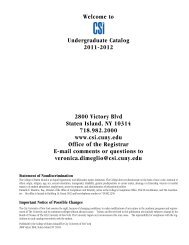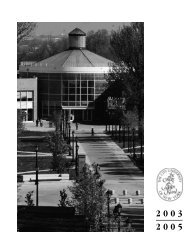Csi undergraduate conference on research, scholarship...
Csi undergraduate conference on research, scholarship...
Csi undergraduate conference on research, scholarship...
You also want an ePaper? Increase the reach of your titles
YUMPU automatically turns print PDFs into web optimized ePapers that Google loves.
P O S T E R 9 3<br />
Jazz Vocal Improvisati<strong>on</strong><br />
Linda Soria<br />
Faculty Mentor: Dr. William Bauer<br />
Department of Music<br />
Since last September I have been actively engaged<br />
in the study of jazz singing. I am exploring the<br />
intricacies of jazz vocal technique through the<br />
study of such popular jazz standards as “Black<br />
Coffee,” “St. Louis Blues,” and “What are You Doing<br />
the Rest of Your Life?” In my practice, I approach<br />
these s<strong>on</strong>gs from the various perspectives of<br />
bandleader, arranger, storyteller, actress, improviser,<br />
and performer. I examine each s<strong>on</strong>g in detail,<br />
paying attenti<strong>on</strong> to every note and lyric. Phrasing—<br />
the way a performer links musical ideas to other<br />
ideas to create <strong>on</strong>going flow and movement—plays<br />
an important role in this investigati<strong>on</strong>, as it helps<br />
me to form and to bring forth my own pers<strong>on</strong>al<br />
visi<strong>on</strong> of the s<strong>on</strong>g. I explore ways to produce<br />
tensi<strong>on</strong> between the band and the singer by<br />
suspending the sense of predictable time in the<br />
vocal line, using a technique known as “back<br />
phrasing”—lagging behind the beat—that Billie<br />
Holiday brought to a high level of development. In<br />
the process of working <strong>on</strong> this technique, I learned<br />
that the relati<strong>on</strong>ship between accompanist and<br />
singer is essential to the success of any s<strong>on</strong>g that I<br />
am interpreting. In order to establish a musical<br />
relati<strong>on</strong>ship between singer and accompanist, both<br />
must listen to and trust each other. Improvisati<strong>on</strong><br />
enables them each to follow their creative impulses<br />
as they adhere to the s<strong>on</strong>g’s harm<strong>on</strong>ic plan. When I<br />
improvise vocally using syllables (also known as<br />
scatting), listening to the accompaniment allows<br />
me develop new ideas <strong>on</strong> the spot, helping me to<br />
become more engaged in the s<strong>on</strong>g’s delivery. The<br />
approach I have taken in this investigati<strong>on</strong> has<br />
given me more c<strong>on</strong>fidence in myself, not <strong>on</strong>ly as a<br />
performer, but as a creative artist. I hope that<br />
approaching s<strong>on</strong>gs in this manner makes my<br />
delivery of a s<strong>on</strong>g effective and compelling for the<br />
listener. It certainly makes the process of building<br />
an interpretati<strong>on</strong> into a creative journey.<br />
P O S T E R 9 5<br />
Research Poster Presentati<strong>on</strong>s<br />
Performance Management of<br />
Transportati<strong>on</strong> Systems: Less<strong>on</strong>s<br />
from Australia and New York<br />
Kenneth Browne<br />
Faculty Mentor: Dr. J<strong>on</strong>athan Peters<br />
Department of Business<br />
In this project we will compare and c<strong>on</strong>trast the<br />
performance standards and operati<strong>on</strong>al practices of<br />
mass public transportati<strong>on</strong> systems in Australia and<br />
the United States of America. The focus will be<br />
emphasized <strong>on</strong> the regi<strong>on</strong>s of Canberra, Australia<br />
and Staten Island, New York. Both regi<strong>on</strong>s are<br />
similar in demographics and populati<strong>on</strong>; and both<br />
utilize bus service as the primary means of public<br />
transportati<strong>on</strong>.<br />
The systems studied in detail will be New York City<br />
Transit (NYCT) and the Australian Capital Territory<br />
Internal Omnibus Network (ACTION). The project<br />
will compare internati<strong>on</strong>al and domestic operating<br />
standards and performance measures for the<br />
systems deployed in Canberra and in Staten Island,<br />
New York. The topics involved in <strong>research</strong> and<br />
discovery will be: How are the transportati<strong>on</strong><br />
systems utilized and what are the user bases? What<br />
performance metrics are used by both companies?<br />
What are the different styles of performance<br />
management of the transportati<strong>on</strong> systems? What<br />
is the comparative cost structure between the two<br />
companies? What type of revenue collecti<strong>on</strong> system<br />
is instituted? Our goal is to understand what can<br />
ACTION and NYCT can gain from examining<br />
alternative operati<strong>on</strong> methods, and also how<br />
internati<strong>on</strong>al standards of performance can be<br />
shared between systems.<br />
69





